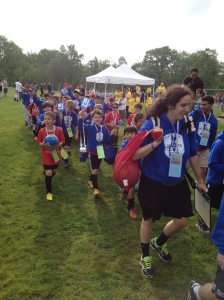Friendly competition
Nine- and ten-year old athletes crowded into the gymnasium, each JCC delegation sporting a different color. They nervously fiddled with their gloves and rackets, either trying not to look at their opponents around the court, or staring down the competition they would soon be facing. (Or perhaps they were just checking out each other’s $130 shoes?!)
As the mini-athletes took the field for the opening ceremony this past Sunday, they smiled large for the cameras, proudly displaying their hometown banners, clearly excited about kicking off the first (hopefully annual!) JCC Mini-Maccabi Games. Welcoming the 200-plus athletes and their families (from as far away as Baltimore) to JCC Rockland, I asked them if they knew the Hebrew word chaver. “Friend,” many of them exuberantly called back to me. Actually, they were 9 and 10, so it sounded more like “frieeeeeeend!” Yes, friend.
But to the teachers of our tradition, I explained, the word chaver meant much more than someone with whom we play and socialize. The chaver is also our competition, the one who challenges us to be our best, the one who forces us to refine our strengths and inspires us to give our best effort. In the Jewish tradition, we learn with a chaver who will not always agree with us or accept our argument. Our study partner is expected to push back, to challenge our assumptions, to introduce us to new ways of thought.
On the fields of play, our teammates may indeed be our friends and playmates. They may also, however, force us to grow, challenge us to be better, and sometimes require us to face our shortcomings. And the same may be true of our opponents. If they care about us and our development (and that is an important Jewish assumption in this equation), they too may be our chaverim. They may teach us how to win and lose graciously, help us develop resilience, remind us how much harder we must work if we expect to succeed.
Not everyone can be a winner all the time. And we need not–and should not–protect our children from the experience of losing in life. Certainly we want them to experience success in areas that bring them satisfaction. As parents, teachers and mentors it is our job to help our children find situations where they will experience success, or at a minimum help them learn confidence, recognize growth and feel satisfaction in their efforts. It is also our responsibility, however, to to teach them how to own and use failure.
Whether you win or lose, it is NOT how you play the game. It’s about what the experience of playing teaches you about yourself. That’s what a worthy and true chaver–even one on the opposing team–can help you learn.
Rabbi Craig Scheff



Love the message–passed it along to our children (to benefit existing and future grandkids :)) and will share with my chaverim.